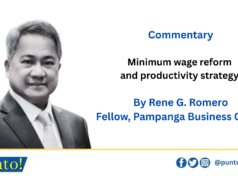“MAGTANIM KA na lang ng camote. (Go home and plant root crops).”
So was the dismissive prejudgment of our elementary school teachers on their academically challenged pupils.
“Magtanim ay di biro, maghapong nakayuko. Di ka man makatayo, di ka man makaupo. (Planting rice is never fun, bent from morning till the set of sun. Cannot stand and cannot sit, cannot rest for a little bit.)”
So goes the ditty learned from our youth.
And what did these leave us with? A national mindset that abhors farming. Further reinforced by the lowly, nay, the lowliest spot given to the peasant in Filipino feudal society. A farmer is not so much born into the world as condemned into it, to paraphrase some social philosopher of the earlier centuries.
To be fair, the improvement of the farmer’s lot was never missing in the development agenda of every administration from Quezon to Magsaysay, from Marcos to Macapagal-Arroyo. Alas, it never went out of the agenda of discussion though, its resolution toward some meaningful socio-economic transformation always falling flat at the foot of the landed interests, who, as Juan and Pedro know, have always controlled the government. Witness what happened – and still is happening – to the Comprehensive Agrarian Reform Program.
Last year’s rice crisis raised concerns on the sorry state of Philippine agriculture anew. The lowly farmer becoming the hero of the moment, with food security becoming the recurrent buzzword of the Macapagal-Arroyo administration. With the crisis leveling off and then dissipating though, the farmer is relegated to his neglected state.
It comes as a most pleasant surprise then to hear presidential hopeful Senator Loren Legarda calling on high school graduates to forego “glamour” in favor of agriculture in their choice of careers. Legarda was guest speaker at the graduation rites of the San Vicente High School in Lubao own last week.
The chair of the Senate committee on agriculture, lamented the preference of the youth for “glamorous” jobs like being call center agents or nurses. Even as she rued a common situation in the breadth of the archipelago where fathers till the land and mothers tend the seedlings while their children opt to get jobs in urban areas, leaving the country with an aging agriculture workforce.
“Forestry, agriculture, veterinary medicine, and marine culture are areas for development and we need graduates in these areas if the country is to bat for food security,” Legarda said, disclosing that her committee has allotted scholarships in agriculture to state colleges and universities.
There is indeed cause for concern here brought about by the progressive – or should it be regressive? – decline in enrolment in agriculture courses, to wit: 84,609 students in some 40 state universities and colleges for school year (SY) 2002-2003; dropping to 78,201 in SY 2003-2004; and to 70,680 in SY 2004-2005.
In the first semester of 2008, Legarda revealed that only 65,734 students enrolled in agriculture and related courses.
“The increase in the number of scholarships for agriculture would help increase enrollees,” Legarda hoped.
Of course, Legarda is not alone in this endeavor. Last year, in response to a directive from the President to play a pivotal role in the food security campaign of government, the Commission on Higher Education proposed the cancellation of board licensure examinations for agriculture courses.
CHED Commissioner Nona Ricafort said the proposal was intended precisely to increase enrolment in those courses.
The efforts should not end there though.
“We also have to provide additional incentives and financial assistance to agriculture graduates so that they could also be entrepreneurs while tilling the land,” Legarda said.
That, yes, and more. Like providing farmers the land to till – through a truly comprehensive agrarian reform program responsive to their needs, befitting of their dignity. Like the provision of greater government subsidy to them. Like a total ban on the conversion of agricultural land for other purposes. These, among many other interventions and initiatives to free the farmer from the status of a beast of burden and elevate him to his rightful place as feeder of the nation.
So was the dismissive prejudgment of our elementary school teachers on their academically challenged pupils.
“Magtanim ay di biro, maghapong nakayuko. Di ka man makatayo, di ka man makaupo. (Planting rice is never fun, bent from morning till the set of sun. Cannot stand and cannot sit, cannot rest for a little bit.)”
So goes the ditty learned from our youth.
And what did these leave us with? A national mindset that abhors farming. Further reinforced by the lowly, nay, the lowliest spot given to the peasant in Filipino feudal society. A farmer is not so much born into the world as condemned into it, to paraphrase some social philosopher of the earlier centuries.
To be fair, the improvement of the farmer’s lot was never missing in the development agenda of every administration from Quezon to Magsaysay, from Marcos to Macapagal-Arroyo. Alas, it never went out of the agenda of discussion though, its resolution toward some meaningful socio-economic transformation always falling flat at the foot of the landed interests, who, as Juan and Pedro know, have always controlled the government. Witness what happened – and still is happening – to the Comprehensive Agrarian Reform Program.
Last year’s rice crisis raised concerns on the sorry state of Philippine agriculture anew. The lowly farmer becoming the hero of the moment, with food security becoming the recurrent buzzword of the Macapagal-Arroyo administration. With the crisis leveling off and then dissipating though, the farmer is relegated to his neglected state.
It comes as a most pleasant surprise then to hear presidential hopeful Senator Loren Legarda calling on high school graduates to forego “glamour” in favor of agriculture in their choice of careers. Legarda was guest speaker at the graduation rites of the San Vicente High School in Lubao own last week.
The chair of the Senate committee on agriculture, lamented the preference of the youth for “glamorous” jobs like being call center agents or nurses. Even as she rued a common situation in the breadth of the archipelago where fathers till the land and mothers tend the seedlings while their children opt to get jobs in urban areas, leaving the country with an aging agriculture workforce.
“Forestry, agriculture, veterinary medicine, and marine culture are areas for development and we need graduates in these areas if the country is to bat for food security,” Legarda said, disclosing that her committee has allotted scholarships in agriculture to state colleges and universities.
There is indeed cause for concern here brought about by the progressive – or should it be regressive? – decline in enrolment in agriculture courses, to wit: 84,609 students in some 40 state universities and colleges for school year (SY) 2002-2003; dropping to 78,201 in SY 2003-2004; and to 70,680 in SY 2004-2005.
In the first semester of 2008, Legarda revealed that only 65,734 students enrolled in agriculture and related courses.
“The increase in the number of scholarships for agriculture would help increase enrollees,” Legarda hoped.
Of course, Legarda is not alone in this endeavor. Last year, in response to a directive from the President to play a pivotal role in the food security campaign of government, the Commission on Higher Education proposed the cancellation of board licensure examinations for agriculture courses.
CHED Commissioner Nona Ricafort said the proposal was intended precisely to increase enrolment in those courses.
The efforts should not end there though.
“We also have to provide additional incentives and financial assistance to agriculture graduates so that they could also be entrepreneurs while tilling the land,” Legarda said.
That, yes, and more. Like providing farmers the land to till – through a truly comprehensive agrarian reform program responsive to their needs, befitting of their dignity. Like the provision of greater government subsidy to them. Like a total ban on the conversion of agricultural land for other purposes. These, among many other interventions and initiatives to free the farmer from the status of a beast of burden and elevate him to his rightful place as feeder of the nation.




